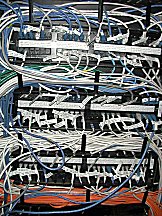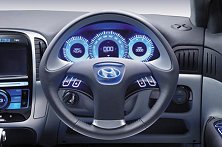 There's a downside of convergence after all
There's a downside of convergence after all
What's this? Convergence-mad Steve eating humble pie? After a fashion, yes, although there are extenuating circumstances, the subject of this editorial. In short, convergence isn't always best.
In an ideal world, of course, converged devices would work perfectly and everything would be rosy. But whether I'm looking at the world of smartphones (whether S60, UIQ or Windows Mobile), desktops (Windows XP or Mac), hard disk recorders (PVRs, a current fascination of mine) or even cars, I'm seeing the same factor in action. In short, modern systems are now so complex that it's impossible for them to work perfectly.
Consider a modern S60 3rd Edition smartphone, running Symbian OS 9. The core OS itself now runs to many millions of lines of source code, S60's interface layers and extra modules doubtless add another few million and then there are complications added by specific software routines needed for particular hardware (e.g. different cameras, built-in GPS, 3G, etc.) Now add in third party software, which may or may not be well behaved. And then consider that the OS is 'real time', in that all the different parts mentioned above (a typical S60 3rd Edition smartphone has over 100 separate concurrent 'processes' all running at the same time) have to work together in perfect harmony, no matter what comms conditions exist and no matter what sequences of keypresses you make at inopportune moments.
The result is a very, very complex software system that thankfully works most of the time but falls over under specific conditions or under extreme stress. It shouldn't, of course, but there's simply no way that something this complicated can be 100% bug free and 100% reliable. And the same goes for cars, PVRs and desktop OS, too.
 First hand, real world examples
First hand, real world examples
Take my car. It's five years old, not that much in car terms, especially as it's a diesel. But every month, some little thing goes wrong, nothing too serious, usually electrical niggles (faulty window switch, blower resistor pack, that sort of thing) - and look at the computer-run cars of today and you'll find even more complex systems. A friend was telling me today that sometimes her cutting edge car has a mind of its own (windows going up and down without reason, warning lights coming on and then going off again, etc.) Again, it's that the system is so complicated that in the real world it's just never going to be 100% problem free and reliable.
With PVRs, my Technosonic hard disk recorder in my living room had so many glitches when I bought it that I've been very eager for each (roughly monthly) over-the-air software upgrade. And even today, it's got more problems than I'd care to list here. From reading Internet reviews, it seems other brands are just as full of glitches.
My Windows XP PC, despite being patched up to date, still crashes every now and then and various things gradually stop working properly until, once a week or so, I end up rebooting. Yes, I've got quite a few third party applications loaded, adding further to the complexity of the software system, but isn't that the point of a computer?
Or, closer to AAS, take my love relationship with the Nokia N93. OK, so it can do everything. From email to games to still photos to DVD video recording to Wi-Fi web browsing to movie playback, this smartphone does the lot. Enormously impressive. Yet again my observation holds true. Firstly, the hardware. Mine is still working fine, but that double-swivel hinge sees an awful lot of motion everytime you use the device and the intricacies of making the hinge in the first place mean a very high level of complexity - the (very experienced) technician at my local Nokia service centre admitted that this was the only handset he couldn't repair and that he was scared stiff of it; any hardware problem and he'd post the device off to Nokia.
Then there's the software, as mentioned earlier. And yes, it's on the very latest v20 firmware. Pick it up at any given moment and the chances are that it'll behave. But use it 24/7 and you'll soon hit glitches. I was videoing my daughter's church nativity scene, I pressed 'Stop' at the end, and the N93 froze, requiring a battery-out restart and of course the priceless video moment was lost forever. A couple of days later, the N93 failed to wake me in the morning - some rogue process had been running all night and had drained the (full) battery.
 Getting to 99.9%
Getting to 99.9%
Now, I'm a sympathetic guy. I know how hard a smartphone has to work (just think of those 100 plus processes all churning away) and I press keys and then wait patiently while the processor and software do their thing. And even then I'd say my experience with smartphones (recently on review samples of the Nokia N80, E70 and N93, plus the Sony Ericsson M600 and P990) hovers somewhere around the 95% mark - by which I mean that 5% of the time something goes wrong; a crash, a freeze, an error or just something that shouldn't happen but does. Give a modern smartphone to your teenage acquaintance 'Bazza' and he'll press keys so fast and expect so much from it that it'll get confused faster than you can say 'I'm a desert island celebrity get me out of Eastenders, big brother'. I've watched it happen.
Yes, smartphones are extremely complex software systems. And, realistically, they'll never be 100% bug free - there will always be some circumstance or combination of events that will cause a problem. As a sympathetic power user, I can accept 96 or 97% at a pinch. I simply reach, resignedly, for the battery cover yet again and power cycle the thing. But for smartphones to really make inroads into public consciousness and for them to get word-of-mouth reviews other than 'slow' or 'crashes a lot' they'll have to get up a lot closer to 99.9%.
Getting to 99.9% is going to be next to impossible for something as complicated as the Nokia N93, N95 or Sony Ericsson P990 - there's simply too much to go wrong, both in hardware and software. Which brings me back to my point about convergence, with slightly less converged devices (the Nokia E61, 5500 and Sony Ericsson M600 spring to mind from my immediate experience) having less to go wrong and being much more stable as a result.
Do you think smartphones can 'get to 99.9%'? Or do you own one that is already 'rock solid'? Comments welcome!
Steve Litchfield, 22 December 2006
